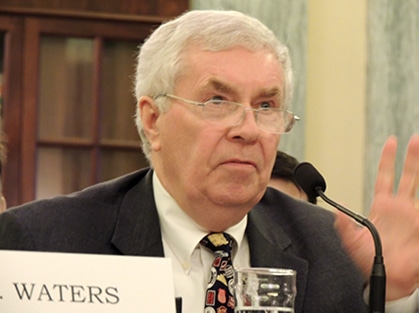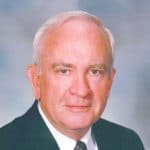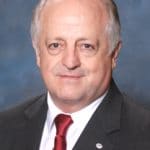SMART Transportation Division National Legislative Director James Stem appeared before the U.S. Senate Committee on Commerce, Science and Transportation June 19 at a hearing to explore improvements in freight and passenger rail safety.
Stem testified on a variety of issues including fatigue, positive train control, the shipment hazardous materials, new technologies and worker training.
Stem told the committee that any discussion concerning rail safety should start with employee fatigue as the first order of business.
“Our railroad corporations are re-investing more than $20 billion annually in upgrading, maintaining and expanding their infrastructure, but are unwilling to invest anything in resolving the most pressing of safety issues – unpredictable work schedules coupled with employee availability policies,” Stem said.
“The Railroad Safety Improvement Act of 2008 contained provisions for two pilot projects sponsored by the Federal Railroad Administration for improving work schedules and employee notification. We have urged all the Class I railroads to participate in a pilot project, but not a single railroad would agree to a pilot.”
Stem offered the following suggestions to address the issue:
•Providing employees a regular start time so they know days in advance when they must come to work. A large majority of our members have a regular start time and do not consider fatigue to be a safety issue. Employees with regular start times are not the employees who are dying in fatigue-related collisions.
•Notifying employees before going off-duty what time they will be required to return to work for the next tour of duty. This option actually improves the availability of the employee by allowing the employee to return to service after only 10 hours off duty.
•Replacing the required 10 hours of undisturbed rest immediately following service that is now required with 10 hours of undisturbed rest immediately preceding service. This will give the employee at least 10 hours of notification prior to reporting for service.
“The high level of professionalism and dedication of the operating crews running our railroads today are the only reasons that accidents are not more frequent,” Stem said.
On positive train control, Stem testified that there are segments of the railroad industry that are hoping Congress will grant a blanket extension of three to five years for PTC implementation. The current required date for implementation is more than 30 months away on December 31, 2015.
“If Congress chooses to grant a blanket extension for PTC, the railroads that are behind on their implementation schedule today will further slow their progress, or just stop the process until that new extension expires,” he said.
“Any extension for PTC implementation should be on an individual basis, short in duration, six to 12 months, and only after identifying the reasons that the current implementation date is not obtainable.
“The PTC systems that are being implemented today contain all the information on thedisplay screen that is necessary to operate a train safely. This will be the first time that the operating crews on the locomotive will have all that information contained in one place and displayed in real time. The quality of that information on the screen will significantly reduce the complexity of safely operating the train.”
Some railroads, including Amtrak, BNSF and Metrolink in California have announced that they will be able to meet the statutory deadline and are continuing the implementation and testing of PTC components.
?On Amtrak, Stem testified about the need for continued funding of the passenger rail carrier.
“Since its inception, Amtrak has done a remarkable job with often inadequate resources. While setting ridership records in recent years, their safety record remains solid. Amtrak’s growing passenger volumes has made them far more self-sufficient than in the past, recovering 79 percent of their operating costs from ticket revenue. The high price of fuel, growing highway and airport congestion, and the significant increase in the number of passenger rail options, all contribute to the constant increases in ridership on Amtrak.
“Even with their remarkable progress, Amtrak has had no shortage of congressional critics who expect Amtrak to be the world’s only profitable passenger railroad. We ask that this committee take a fresh look at this American success story and work with the leaders of Amtrak and others to help ‘America’s Railroad’ build on its 40 plus years of success. Amtrak was created because the demand for rail passenger services remained strong, and the private railroads could not make a profit operating their own passenger trains.”
Addressing worker training, Stem said that thousands of new employees will be coming into the freight and passenger rail industies in the near future and that adequate and appropriate training is a major safety concern.
“Our experience is that the training of our members varies widely from railroad to railroad. Some of the larger railroads are reported to have excellent initial training programs for conductors and engineers. However, they rely almost exclusively on computer-based training for follow-up training or what I call ‘training on your own.’ They no longer use the traditional model of mentoring or apprenticeship, where a new employee has the advantage of working with more mature employees with experience, skills, and good technique.
“Forty years ago, there were five members of a train crew and they spent years working as brakemen before becoming conductors, and likewise, years as a fireman before becoming an engineer. Today, the standard crew size is two. Now railroads hire people off the street and train them to be conductors in several short months. We are concerned about the long-term impact of insufficient training processes that create employees that lack the confidence in their abilities to stop a train movement when they suspect something is wrong.
“It’s expensive to train new people, so like some American companies, railroads, when left to their own desires, will reduce training costs as much as possible for the short term gains involved.”
Also testifying before the committee were Federal Railroad Administrator Joe Szabo, National Transportation Safety Board Chairperson Deborah Hersman and Association of American Railroads President Edward Hamberger.
To read Stem’s complete written testimony, click here.

testifies before the U.S. Senate Committee on Commerce, Science and Transportation
June 19, 2013.

 Former International President Tom DuBose
Former International President Tom DuBose Without the negotiated $200 monthly cap on employee health care contributions, they could rise to $355 monthly by 2015 under the formula in the existing contract.
Without the negotiated $200 monthly cap on employee health care contributions, they could rise to $355 monthly by 2015 under the formula in the existing contract. I’m still feeling the devastating effects of PEB 219 in 1991, which were imposed by a Congress where Sen. Ted Kennedy (D-Mass.) and Rep. John Dingell (D-Mich.), both longtime friends of labor, chaired the key Senate and House transportation committees.
I’m still feeling the devastating effects of PEB 219 in 1991, which were imposed by a Congress where Sen. Ted Kennedy (D-Mass.) and Rep. John Dingell (D-Mich.), both longtime friends of labor, chaired the key Senate and House transportation committees. This is the best deal out there by far: The wage increases, the cap on monthly employee health care contributions, significant savings that can be realized with decreases in generic drug co-pays and added coverage such as personalized medicine, improved entry rates for new hires, certification pay, and no work-rules concessions.
This is the best deal out there by far: The wage increases, the cap on monthly employee health care contributions, significant savings that can be realized with decreases in generic drug co-pays and added coverage such as personalized medicine, improved entry rates for new hires, certification pay, and no work-rules concessions. In a time of unprecedented global economic uncertainty, high unemployment rates and stagnating or retreating wages for most working Americans, this agreement provides for wage increases that far exceed anticipated increases in the Consumer Price Index, plus affordable and superior health care benefits that include the addition of state-of-the-art services and enhancements never before available to UTU members.
In a time of unprecedented global economic uncertainty, high unemployment rates and stagnating or retreating wages for most working Americans, this agreement provides for wage increases that far exceed anticipated increases in the Consumer Price Index, plus affordable and superior health care benefits that include the addition of state-of-the-art services and enhancements never before available to UTU members. It would be irrational for our UTU membership to forsake a 17 percent general wage
It would be irrational for our UTU membership to forsake a 17 percent general wage Our members need to consider today’s double digit increases in health care costs.
Our members need to consider today’s double digit increases in health care costs. This is a very good agreement, regardless of economic conditions; but it is especially good given its increase over price inflation. No previous agreement provided wage increases so far above the Consumer Price Index without significant rules changes, as does this agreement.
This is a very good agreement, regardless of economic conditions; but it is especially good given its increase over price inflation. No previous agreement provided wage increases so far above the Consumer Price Index without significant rules changes, as does this agreement.
 By James Stem,
By James Stem,